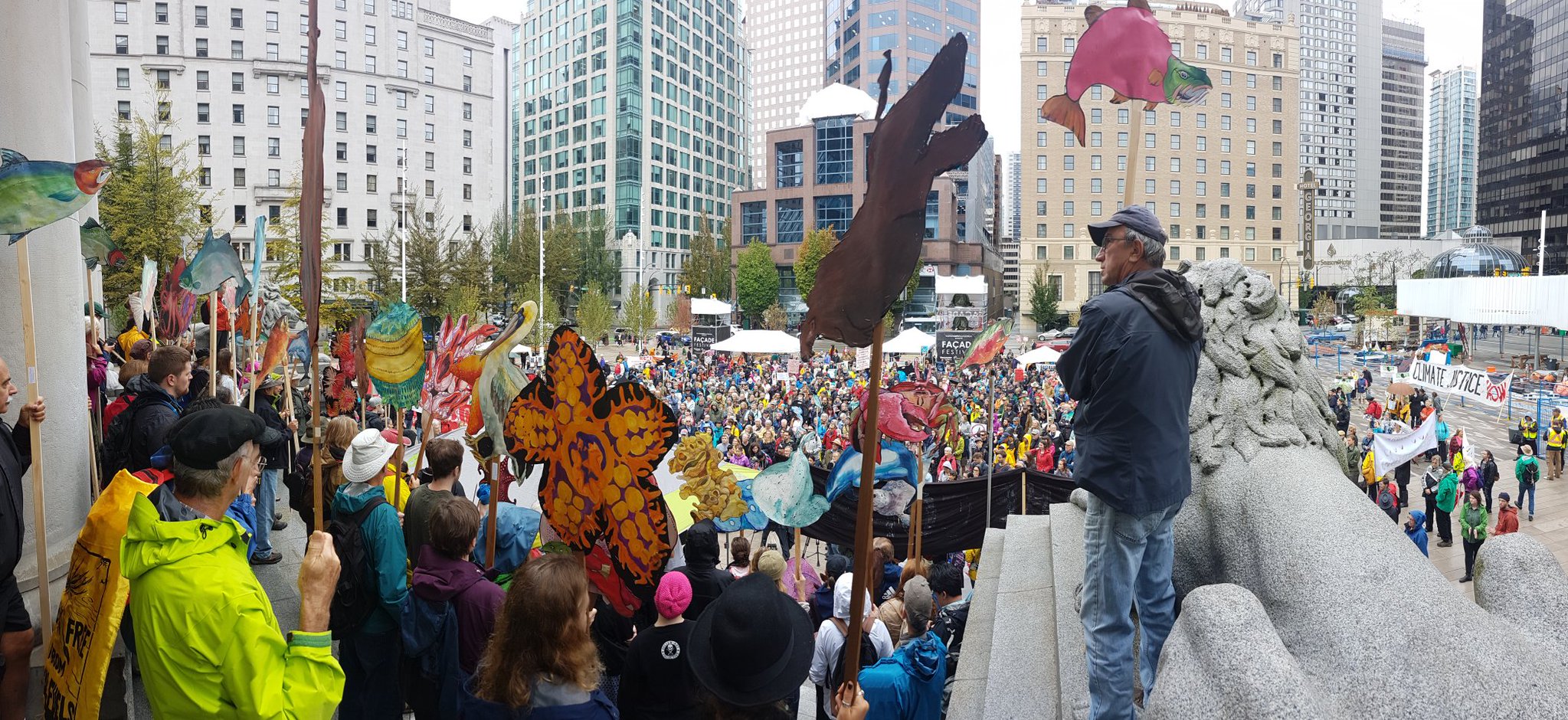
On October 2, 2017 – in just over two weeks – the Federal Court of Appeal (FCA) is scheduled to start the longest hearing in its history, for the consolidated challenges to the National Energy Board (NEB) and Federal Cabinet approval of Kinder Morgan’s Trans Mountain Project. The current record-holder for longest FCA hearing is Gitxaala vs. Canada, also known as the case that killed Enbridge Northern Gateway. That case was heard almost exactly two years prior to the Kinder Morgan hearings.

In a refreshing moment of (legally required) honesty, Kinder Morgan acknowledged the risks associated with the FCA case and others when it stated in its May 25, 2017 prospectus:
In the event that an applicant is successful at the Federal Court of Appeal, among other things, the NEB recommendation or Governor in Council’s approval may be quashed, permits may be revoked, the Trans Mountain Expansion Project may be subject to additional significant regulatory reviews, there may be significant changes to the Trans Mountain Expansion Project plans, further obligations or restrictions may be imposed or the Trans Mountain Expansion Project may be stopped altogether. (at p.29, emphasis added)
Of course, it’s impossible to know with certainty what the outcome of the case will be. What we do know is that the FCA consolidated six challenges to the NEB’s May 2016 recommendation with nine challenges to the November 2016 Federal Cabinet approval, which relied heavily on the NEB recommendation and adopted its 157 conditions without any changes.
So what are the cases all about?
Here’s what Kinder Morgan says about the cases in its prospectus:
Trans Mountain Expansion Project Litigation
The petitions seeking judicial review of the recommendation of the NEB and subsequent decision by the Governor in Council allege, among other things, that additional consultation, engagement or accommodation is required and that various non-economic impacts of the Project were not adequately considered. The remedies sought include requests that the NEB recommendation be quashed, that additional consultations be undertaken, and that the order of the Governor in Council approving the Project be quashed. A decision by the Federal Court of Appeal is subject to potential further appeal to the Supreme Court of Canada.
(at p.F-29)
A flawed NEB process
Most of the parties in the consolidated cases challenge the adequacy of the NEB’s flawed process, which we have written about before (here, here and here).
Raincoast Conservation Foundation and Living Oceans Society (represented by our friends at Ecojustice) argue, among other things, that the NEB and Cabinet failed to uphold the Species at Risk Act with respect to endangered southern resident orca whales, despite finding significant adverse effects to those orcas.

The Cities of Vancouver and Burnaby argue, among other things, that the NEB process failed to consider alternatives to the project, and that it breached a duty of procedural fairness, didn’t adequately test evidence, and provided insufficient reasons for its recommendation. As a result, they say the NEB was unable to understand the risks associated with the project, the brunt of which will be disproportionately borne by the cities.
Seven First Nations filed ten legal challenges which assert many of the procedural and substantive errors above, and also challenge the adequacy of the NEB’s review with respect to each Nation’s unique circumstances and interests, in particular regarding impacts on their Aboriginal Rights and Title. This is a separate issue from assertions of flawed consultation leading up to the Cabinet approval.
The seven First Nations are: Tsleil-Waututh Nation; Squamish Nation; Musqueam Indian Band; Coldwater Indian Band; Aitchelitz, Skowkale Shxwa:y Village, Soow Ahlie, Squiala First Nation, Tzeachten, Yakweakwioose, Skwah, Kwaw-Kwaw-Aplit & Ts’elxweyeqw Tribe et al (Sto:lo); Upper Nicola Band; and Stk’emlupsemc Te Secwepemc.
Canada’s marine shipping flip flop?
The Tsleil-Waututh Nation has repeatedly argued that the NEB’s failure to consider marine shipping as part of the project under the Canadian Environmental Assessment Act 2012 (CEAA 2012) was a legal error. Of course, the ability to ship oil overseas in tankers is the main purpose of the project – and this presents a plethora of risks.
Tsleil-Waututh raised this issue at the NEB hearing and again in its appeal of the NEB’s initial hearing order. That case was dismissed on procedural grounds, with the substantive legal issues specifically preserved for a future case.
The NEB did review marine shipping under the National Energy Board Act, but not under CEAA 2012 which would have added further legal requirements. As Tsleil-Waututh states in its Memorandum of Fact and Law, “Without marine shipping, the Project would constitute the proverbial ‘pipeline to nowhere.’ Marine shipping from the Terminal through Burrard Inlet is essential for the pipeline to have any utility.”
The government of Canada has consistently argued that it was okay to exclude marine shipping from the Kinder Morgan review. However, in its May 31, 2017 submission to the NEB panel reviewing the Energy East pipeline project, Canada stated the exact opposite:
The Government of Canada takes the position that project-related marine shipping within Canada’s territorial sea is integral to the Project and that the environmental effects of marine shipping activities should be considered by the NEB’s environmental assessment of the Energy East project under the Canadian Environmental Assessment Act, 2012 (CEAA, 2012).
This about-face did not go unnoticed, and Tsleil-Waututh filed a motion to have Canada’s submission to the Energy East panel included in the record. That motion will be heard by the FCA. [Update: The FCA dismissed Tsleil-Waututh's motion on Sept 18th, 2017]
With the Energy East and even Enbridge Northern Gateway reviews considering the effects of marine shipping, why then, is it okay to exclude it from the Kinder Morgan review? All three projects are substantially similar in their purpose of accessing tidewater for export markets.
The implications of this inconsistency could be significant, not just for the review of marine shipping impacts of the project, but also in the assessment of Canada’s conduct in discharging its constitutional duties to First Nations, which is grounded in the honour of the Crown.
Inadequate consultation with First Nations
It shouldn’t be a surprise that some of the main issues raised by each First Nations applicant are the deficiencies in constitutionally-required Crown consultation.
It is important to note that each First Nation’s legal challenge is based on unique facts relating to its specific territory, rights and title. This raises an independent duty to consult and accommodate each individual First Nation. In other words, the extent and content of consultation is specific to the facts and circumstances for each First Nation, and satisfying the duty to consult and accommodate one First Nation does not guarantee that the duty has been fulfilled for another. Success on any one of the First Nations’ (or other parties) legal challenges could delay or stop the project.
The legal challenges submitted by First Nations highlight issues of constitutional, administrative, procedural and statutory law. They allege, among other issues:
- that the government failed to address concerns raised repeatedly by First Nations, constituting a breach of the constitutional duty to consult and accommodate. For example, the Coldwater Band’s concerns are focused on the impact of the project on their drinking water, which could have been addressed with a change in the route;
- that the government unjustifiably infringed claimed Aboriginal rights and title; and
- that the government breached its fiduciary duty to consult the affected First Nations.
Each of the First Nations’ legal challenges at the FCA argues that the highest level of consultation is required, and the level of consultation has been inadequate. Three months before consultation ended, the federal government agreed that the duty to consult requires a high level of consultation.
Two of the applicant First Nations (Musqueam and Sto:lo) have already confirmed fishing rights at the Supreme Court of Canada (SCC) in waters directly affected by the project. Most of the legal challenges assert that the applicant First Nation has unextinguished Aboriginal title or rights over the proposed pipeline and tanker route, invoking both the leading SCC case on Aboriginal title, Tsilhqot’in, as well as the duty to consult and accommodate and seek consent.
It seems investors have learned a lesson from the Enbridge case – with one commenter stating:
The plethora of claims should deeply concern Kinder Morgan investors. The plaintiffs simply need to win one of the 15 claims in order to significantly delay the project. Kinder Morgan must win every single one. The odds, in other words, are stacked against the company. To make matters worse for Kinder Morgan, the provincial government was granted intervenor status to formally join the legal challenges against the Expansion.
BC and Alberta intervention
The new BC government has committed to “employ every tool available to defend BC's interests in the face of the expansion of the Kinder Morgan pipeline, and the threat of a seven-fold increase in tanker traffic on our coast.” West Coast has published a Legal Toolbox to Defend BC from Kinder Morgan, to outline a number of key tools available to the BC government.
One of the first tools deployed was hiring renowned Indigenous rights lawyer Thomas Berger to oversee the Kinder Morgan file. BC followed by applying to intervene at the FCA case, and was granted approval on August 29, 2017. As Justice Stratas stated in his reasons for allowing the late intervention:
Two provinces are most directly affected by these proceedings, Alberta and British Columbia. The public interest of Alberta has been given a voice in these proceedings. The public interest of British Columbia deserves a voice too. (para 35)
Interveners do not have the same rights of participation as parties to the litigation, but they can play an important role in assisting the court to understand the legal issues. As stated in the BC intervention decision:
In this Court, interveners are guests at a table already set with the food already out on the table. Interveners can comment from their perspective on what they see, smell and taste. They cannot otherwise add food to the table in any way. (para 55)
Hamlet of Clyde River and Chippewas of the Thames
Two other recent cases heard by the Supreme Court of Canada (SCC) have addressed the role of the NEB in discharging the Crown’s duty to consult First Nations, and have important implications in the legal challenges over Kinder Morgan.
When it was announced that the SCC would release its decisions in the Clyde River and Chippewas of the Thames cases this summer, the parties in the Kinder Morgan cases were given an extension to incorporate the decision into their legal arguments. The SCC overturned the NEB’s decision in Clyde River v. Petroleum Geo-Services Inc. and upheld the decision in Chippewas of the Thames First Nation v. Enbridge Pipelines Inc., adding a little more clarity to the issue of adequate consultation.
Canadian courts are slowly unveiling what the minimum standard of consultation – the floor – looks like. However, in the era of reconciliation, and with commitments to implement the UN Declaration on the Rights of Indigenous Peoples (UNDRIP), when the honour of the Crown is at stake, do we want our elected officials to aim for the floor, or something higher?

The Federal Court of Appeal (at 701 W. Georgia St., Vancouver) is scheduled to hear the consolidated Kinder Morgan case from October 2-13, 2017. From what we’ve seen in the fight to stop Enbridge Northern Gateway, it’s clear that these legal challenges could have profound impacts on the Trans Mountain project and whether it’s permitted to go ahead.